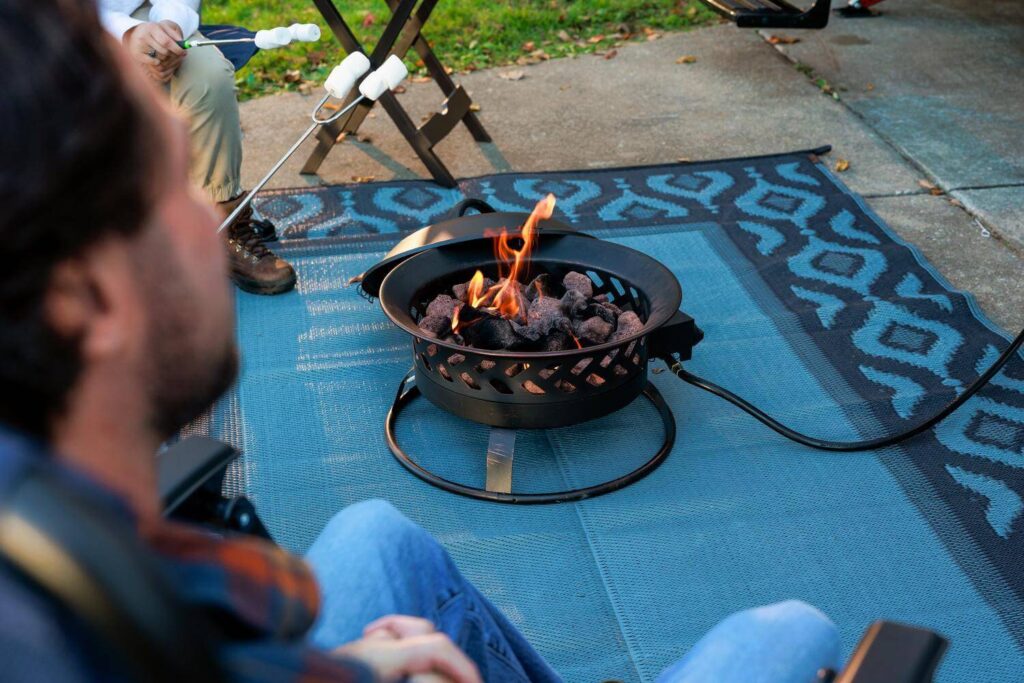As a new RV camper, learning proper RV campground etiquette will enhance the experience for you and those around you while preventing a few potentially uncomfortable situations. All campgrounds have rules on things like quiet hours, trash collection, and pet leash policies. So, while we highly recommend consulting those RV campground rules and regulations before your stay, here are some golden guidelines of basic campground etiquette for campers.
Table of Contents
ToggleRespect Campground Quiet Hours

Most parks have designated quiet hours. The stipulations within these quiet hours vary from camp to camp, but they all require keeping noise down to a minimum. You won’t be dancing to blaring music around a bonfire into the wee hours of the morning unless you’re off-grid in a relatively remote boondocking location.
Many campgrounds also have quiet hours that regulate campground generator etiquette. For example, you may not run your RV’s onboard generator or a portable camping generator after 10 p.m. and before 6 a.m. Those hours can differ by location, but the concept remains the same.
If you walk from your camp to the center of the campground road and can still hear your music or the game on your outdoor TV, you could likely stand to turn the volume down. If you arrive late or leave early during quiet hours, keep noise to a minimum. Set up the bare essentials and save the rest for the morning. Pack up 99% of camp the night before to avoid slamming compartment doors at 5 a.m. Trust us, your neighbors will thank you.
Embrace Stargazing
For those who have recently transitioned from tent camping to RV camping, it’s natural to overuse your RV amenities. But one pet peeve that is sure to irk other campers is leaving your outdoor patio lights on all night. Most campers still love to sit outside with nothing but firelight illuminating the night. And they sure don’t want your trailer’s bright LED lights shining into their RV window when they’re trying to fall asleep.
As a general guideline, the start of campground quiet hours is a good time to turn off your camper’s outdoor lights. If you stay up (quietly!), use a flashlight, headlamp, or lantern to move safely around your site.
Looking for the best flashlight for camping?
Spread Out
In many cases, you’ll book campsites in advance. But when it comes to RV campground etiquette for first-come, first-served RV parks, you’ll sometimes arrive at a relatively empty campground where you can choose your own spot. In these cases, maintain a respectful distance from the other campers.
Don’t be one of those campers who selects the spot next to the only other RV in a 40-site RV park. If you have options, give everyone space to spread out and enjoy the campground.
Be a Responsible Pet Owner

Keeping pets under control in an RV campground can be a divisive issue. Not everyone will feel the same about your pet as you do, but you can follow three simple rules to respect your non-pet-loving RV neighbors.
- Keep pets on a leash (unless in a designated off-leash area)
- Pick up after your pets (even inside dog parks!)
- Don’t leave pets unattended
Sure, pets on the road need as much regular exercise as they can get. But keep them on a leash when you’re exploring the campground, and be mindful of other campground pets that may be on a lead outside an RV. And if you leave your pets on a lead outside, ensure the lead length doesn’t allow them to roam into the street or a neighboring campsite.
Most campgrounds don’t allow leaving pets unattended, but this is an essential rule if your pet is particularly vocal when left alone. Campgrounds are busy with people walking by, kids riding bikes or other traffic. The street may not be as quiet as yours at home. So take extra precautions to respect your neighbors and avoid pet confrontations.
Don’t Cut Through Other Campsites
Many campers view their site as their rental property. It’s their space for the duration of their stay, so you should respect it just like your neighbor’s home property. That means avoiding what may be RV Pet Peeve #1 for many campers: cutting through a neighbor’s campsite.
Sure, it might make the trip to the bathroom or dumpsters shorter. But what’s the hurry? You are camping, after all. Take some extra steps while respecting other campers’ space in the process. You likely wouldn’t want someone wandering around in your front yard, so practice the golden rule when it comes to staying out of other sites.
That’s not to say you can’t make new friends—especially if your neighbors are out and about!
Leave No Trace
Practicing good RV campground etiquette is as simple as leaving your campsite just like you found it—or better. This means picking up all your trash (not throwing it in the fire!) and returning any rearranged items, like a picnic table, to their original position. Perhaps most importantly, ensure your campfire is completely doused before you leave.
Add a collapsible trash can to your RV gear list to avoid a major cleanup on your checkout day. You’d be surprised how simply giving yourselves an outdoor receptacle will make cleaning up after meals or campfire S’mores much easier. Just ensure you don’t leave that trash outdoors overnight if you’re camping in bear country!
Be Aware of Fire Bans

Out in California during a drought? That campfire may not be a great idea. If you don’t live in a fire-prone area, fire bans are often an afterthought. For most of us, camping is synonymous with having a campfire. Unfortunately, that’s not always the case, especially if you’re on a western RV road trip in the late summer or early fall.
So, it’s essential to research fire bans where you’re traveling. The easiest way to check is to contact your campground directly. If you’re camping off-grid, you’ll need resources from the US Forest Service or other land management agencies to check regional fire restrictions.
Some campgrounds and agencies may also restrict the transport of firewood. For these reasons, many RV campers carry a portable fire pit as a backup. These provide the warmth and ambiance of a traditional fire without the need for actual wood, and many can be used even when a fire ban is in place.
Respect Wildlife
You’ll find exciting new wildlife wherever you take your RV. From iguanas wandering through campsites in the Florida Keys to bear visitors in places like Glacier National Park, wildlife will look much different depending on where you travel. But you’ll always need to maintain a healthy distance and respect wildlife.
Camp hosts and park regulations are your best guides to the type of wildlife you might encounter and the best strategies to avoid a confrontation. In most cases, practicing food safety is Rule Number One: never leave food outside or unattended in your site! If your site has a bear box, use it wisely to avoid giving wildlife any incentive to break into your vehicle or RV in search of a tasty snack.
Share Campground Amenities

Especially if you’re camping with kids, RV parks offer the benefit of amenities like playgrounds, swimming pools, tennis courts, and much more. However, you must remember that you share those amenities with your fellow campers. RV resorts rarely regulate how long you can use a given amenity, so it’s up to you to avoid monopolizing certain amenities so that other guests can enjoy them too.
Talk to the Campground Staff
This may be the most underrated rule of proper campground etiquette. RV park staff work hard to keep their sites clean, operate any offered amenities, and respond to camper requests promptly. They are the unsung heroes of the RV camping industry, and they appreciate it when you respectfully bring any campground issues to their attention.
That could be as simple as letting them know you spotted a hazard on a walking trail. It could be something more complex, like an improperly wired power pedestal. Maybe you just enter a casual dialogue by asking for dining recommendations in the local area. You’ll be surprised by the insider tips you can get from campground staff. And they’ll appreciate your thoughtful, respectful efforts to help them maintain the best possible camping experience for future guests.
In my experience, the RV community is always ready to lend a new camper a hand, making you feel welcome wherever you travel. Following these rules will help you respect your neighbors and keep your favorite campgrounds in the best shape for the next visitors.
Are you ready to join the RV camping world? Use these resources to find your ideal RV:
- Best Small Campers of 2025
- Do You Need a Travel Trailer with 2 Bathrooms?
- Best Class C RVs Under 25 Feet
What camping etiquette tips or RV pet peeves would you share with first-time campers? Let us know in the comments below!
Author
-

For nearly 60 years, Camping World has made RV ownership and the outdoor lifestyle safe, fun, and easy.
View all posts








